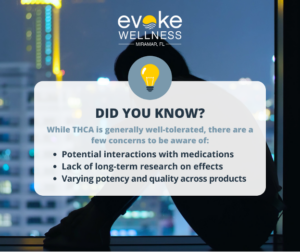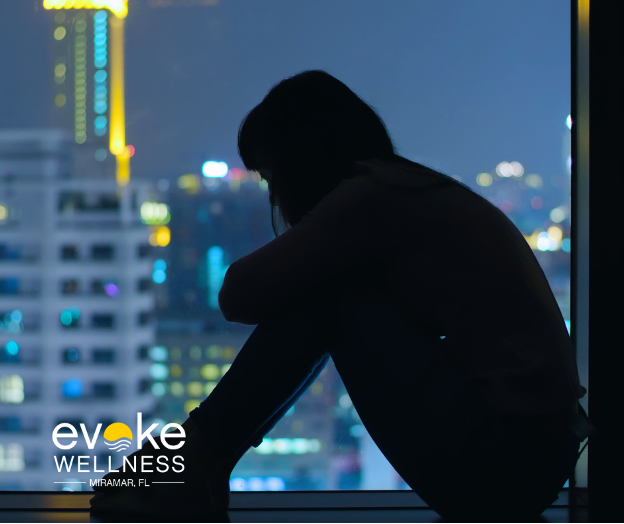Tetrahydrocannabinolic acid (THC A) is a non-psychoactive cannabinoid found in raw and live cannabis plants. Unlike THC, THC A does not produce a high until it is decarboxylated through heat. This compound is gaining attention for its potential therapeutic benefits, including anti-inflammatory, neuroprotective, and antiemetic properties. Understanding THC A can help individuals make informed decisions about cannabis use and treatment options for those struggling with cannabis dependence or other substance use disorders.
Call Evoke Wellness at Miramar Today at (833) 819-6066 or reach out online.
Treatment Options for a Loved One
When a loved one is struggling with substance use, finding the right treatment program is crucial. Evoke Wellness at Miramar offers a variety of comprehensive treatment options designed to address the unique needs of each individual.
Residential Treatment Program
- 24/7 Supervision and Support: Provides a safe and structured environment.
- Intensive Therapy: Daily therapy sessions, including individual, group, and family therapy.
- Medical Detox: Supervised detoxification process to manage withdrawal symptoms.
- Holistic Approaches: Incorporates yoga, meditation, and other holistic therapies.
Outpatient Program
- Flexible Scheduling: Allows individuals to continue daily responsibilities while receiving treatment.
- Therapeutic Support: Weekly therapy sessions and support groups.
- Continued Care: Ongoing support for relapse prevention and recovery maintenance.
- Step-Down Care: Transition from intensive residential treatment to outpatient care.
Dual Diagnosis Treatment
- Integrated Approach: Addresses both substance use and co-occurring mental health disorders.
- Specialized Therapists: Trained to treat complex cases involving dual diagnoses.
- Comprehensive Assessments: Thorough evaluations to develop personalized treatment plans.
- Coordinated Care: Collaboration between mental health and addiction specialists.
Relapse Prevention Program
- Coping Strategies: Teaches skills to handle triggers and stressors.
- Support Network: Builds a network of support through group therapy and peer support.
- Ongoing Therapy: Regular check-ins and therapy sessions to maintain sobriety.
- Education: Provides education on relapse warning signs and prevention techniques.
Drug Rehab Program
- Individualized Treatment Plans: Tailored to the specific needs of each patient.
- Evidence-Based Therapies: Utilizes proven methods such as cognitive-behavioral therapy (CBT) and motivational interviewing (MI).
- Holistic Care: Combines medical treatment with holistic practices.
- Family Involvement: Encourages family participation in the recovery process.
Anxiety Treatment Program
- Therapeutic Modalities: Includes CBT, dialectical behavior therapy (DBT), and mindfulness practices.
- Medication Management: Offers psychiatric evaluation and medication management when necessary.
- Stress Reduction Techniques: Teaches relaxation techniques and stress management.
- Comprehensive Care: Focuses on both mental health and substance use issues if present.

THCA: Frequently Asked Questions
What is THCA?
THCA (tetrahydrocannabinolic acid) is the primary compound found in raw, unharvested cannabis plants. It is a non-psychoactive precursor to THC, the psychoactive component responsible for the “high” associated with marijuana use.
How does THCA differ from THC?
Unlike THC, THCA does not produce mind-altering effects. When cannabis is heated (through smoking, vaporizing or baking), THCA undergoes decarboxylation and converts into THC.
Are there potential benefits of THCA?
Early research suggests THCA may have therapeutic potential as an anti-inflammatory, neuroprotective, and anti-proliferative compound. However, more studies are needed to fully understand its effects and applications.
How is THCA consumed?
Since THCA is found in raw cannabis, it can be consumed by juicing fresh cannabis leaves and buds. It is also available as a supplement in capsule or tincture form, though its legality varies by state.
Conclusion
You now have a solid understanding of what THCA is and how it differs from THC. While they share some similarities, THCA does not produce the intoxicating effects of THC until it’s been decarboxylated with heat. As research continues, more medicinal benefits of THCA may be discovered. If substance use disorder impacts your life or a loved one’s, effective treatment options exist, like:
- Residential Treatment Programs
- Outpatient Programs
- Dual Diagnosis Treatment
- Relapse Prevention Programs
- Drug Rehab Programs
- Anxiety Treatment Programs
There is hope – with the right treatment program, recovery is possible. Reach out today to learn more and take the first step.
Begin Your Journey with Evoke Wellness at Miramar
If you or a loved one is considering treatment, Evoke Wellness at Miramar invites you to contact us. Our compassionate team is ready to answer your questions, discuss your needs, and help you take the first steps toward recovery. In Miramar, you’ll find more than just a treatment program – you’ll discover a community dedicated to your wellness and success. Together, let’s embrace the journey to recovery and the promise of a new beginning. Call us at (833) 819-6066 today or reach out online.


